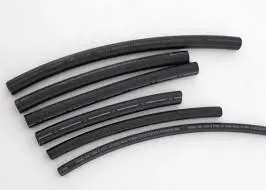Dec . 07, 2024 06:59 Back to list
ce certification teflon/ptfe hose products
CE Certification for Teflon/PTFE Hose Products Ensuring Safety and Quality
Teflon, also known as polytetrafluoroethylene (PTFE), is a synthetic fluoropolymer that has gained immense popularity in various applications due to its remarkable chemical resistance, high thermal stability, and excellent electrical insulation properties. One of the critical applications of Teflon is in the manufacturing of hoses that are designed to handle a wide range of fluids and gases. However, ensuring that these products meet safety and quality standards is paramount, which is where CE certification comes into play.
The CE mark, short for Conformité Européenne, indicates that a product conforms to European safety, health, and environmental protection standards. This certification is mandatory for certain products sold within the European Economic Area (EEA). For Teflon/PTFE hose products, obtaining CE certification is not just a regulatory requirement; it is a testament to the product's quality and reliability.
Importance of CE Certification
1. Consumer Safety The primary purpose of CE certification is to ensure that products meet essential safety requirements. For hoses used in various industries—such as food processing, pharmaceuticals, chemical manufacturing, and automotive—safety is paramount. A CE-certified Teflon/PTFE hose guarantees that it can withstand the pressures and temperatures for which it is designed, thereby minimizing the risk of accidents or failures.
2. Market Access In Europe, CE certification is often a prerequisite for market entry. Manufacturers looking to sell their Teflon/PTFE hoses in European countries must ensure compliance with CE marking directives. Without this certification, products may be prohibited from entering the market, leading to significant financial losses.
3. Quality Assurance CE certification requires rigorous testing and quality control procedures. Manufacturers must demonstrate compliance with relevant European standards, which often involves detailed assessments of materials, construction, and performance. This not only builds trust with consumers but also encourages manufacturers to maintain high quality in their production processes.
4. Regulatory Compliance Different industries have specific regulations regarding the materials used in hoses. For instance, hoses used in food applications must comply with regulations concerning food safety. CE certification provides assurance that Teflon/PTFE hoses meet these specific regulatory requirements, thus protecting both manufacturers and consumers.
The CE Certification Process
ce certification teflon/ptfe hose products

Obtaining CE certification for Teflon/PTFE hoses involves several steps
1. Identify Applicable Directives Manufacturers must identify the directives relevant to their products. For hoses, this could include directives related to pressure equipment, machinery, or specific industry regulations such as those for food contact materials.
2. Conduct a Risk Assessment Assessing risks associated with the hose’s usage—such as pressure ratings, temperature limits, and chemical compatibility—is crucial. This assessment helps in understanding potential hazards and the necessary tests to perform.
3. Testing and Evaluation The product must undergo appropriate testing to verify that it meets the identified standards. This may involve mechanical testing, chemical compatibility testing, and thermal testing, among others.
4. Technical Documentation Manufacturers must compile a technical file that includes specifications, testing results, and compliance records. This documentation is essential for demonstrating conformity to notified bodies during audits.
5. Declaration of Conformity After successfully meeting the requirements, manufacturers can draft a Declaration of Conformity, affirming that the product complies with all relevant European standards.
Conclusion
The CE certification process is a vital step for manufacturers of Teflon/PTFE hose products in ensuring safety, quality, and market access within Europe. With industries increasingly prioritizing safety and sustainability, the importance of CE certification cannot be overstated. For consumers and manufacturers alike, knowing that a product meets stringent European standards fosters trust and confidence, ultimately contributing to safer and more reliable industrial and consumer applications.
In a competitive marketplace, leveraging CE certification for Teflon/PTFE hoses not only helps in compliance but also serves as a significant marketing advantage, highlighting a commitment to quality and safety that is crucial in today’s manufacturing landscape.
-
Best Four Steel Wire Spiral Hose Hydraulic R12 – Durable High-Pressure Hose Manufacturer
NewsJul.08,2025
-
High-Quality 1/4 Hydraulic Hose – Soft, Flexible & Durable Rubber Hoses for Industrial Use
NewsJul.08,2025
-
1 1 2 Inch Hydraulic Flexible Hose - Durable, Reliable, High-Pressure Solutions
NewsJul.07,2025
-
High-Quality 1 2 Rubber Hose - Durable, Flexible Hydraulic Solutions
NewsJul.07,2025
-
Discover SAE Hydraulic Hose Types - High Quality & Durable Hoses from Leading Factory Supplier
NewsJul.06,2025
-
High Pressure Wire Hydraulic Rubber Hose Supplier Durable & Reliable 1SN Hose Solutions
NewsJul.06,2025
